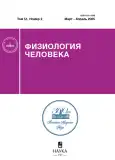ВОЗРАСТНАЯ ДИНАМИКА МОРФОФУНКЦИОНАЛЬНЫХ ПОКАЗАТЕЛЕЙ ОРГАНИЗМА У МУЖЧИН-СЕВЕРЯН
- Авторы: Солонин Ю.Г.1
-
Учреждения:
- Институт физиологии ФИЦ Коми НЦ УрО РАН
- Выпуск: Том 51, № 2 (2025)
- Страницы: 137-144
- Раздел: Статьи
- URL: https://journal-vniispk.ru/0131-1646/article/view/304849
- DOI: https://doi.org/10.31857/S0131164625020109
- EDN: https://elibrary.ru/UDCKFA
- ID: 304849
Цитировать
Аннотация
Цель данного исследования – определить возрастные особенности некоторых показателей физиологического статуса у мужчин-северян в настоящее время. Обследованы лица мужского пола в возрасте от 20 до 69 лет – постоянные жители Севера (63.6° с.ш.). У них определяли морфофункциональные показатели, физиометрические показатели, психофизиологические показатели, физиологические показатели, показатели физического здоровья общепринятыми методами. Сравнивали между собой разные возрастные группы по десятилетиям и проводили корреляционный анализ по Пирсону (параметрический метод). В первом периоде зрелого возраста (20–39 лет) большинство показателей достигает оптимальных значений. Во втором периоде зрелого возраста (40–59 лет) многие функции ухудшаются, а среднединамическое артериальное давление заметнее возрастает. В пожилом возрасте (60 лет и старше) у мужчин-северян наблюдается ускоренная инволюция ряда физиологических функций (силовые показатели, статическая балансировка, переносимость гипоксемии, возможности психомоторики, показатели гемодинамики и интегральные показатели работоспособности и здоровья). Установлены особенности возрастной динамики физиологического статуса северян, состоящие в повышенном артериальном давлении, пониженных силовых показателях и показателях психомоторики и в более выраженном возрастном изменении у взрослых и пожилых этих функций, а также жизненной емкости легких и мышечной работоспособности. Установлена корреляционная связь многих изученных показателей с возрастом. Подавляющее большинство показателей отражает свою довольно высокую и статистически значимую зависимость от возраста. Направленность корреляций закономерно отражает угасание функций с возрастом в периоды зрелости и старости. Практически не связаны с возрастом только масса тела, индекс массы тела, статическая выносливость, частота сердечных сокращений и вегетативный индекс Кердо.
Об авторах
Ю. Г. Солонин
Институт физиологии ФИЦ Коми НЦ УрО РАН
Автор, ответственный за переписку.
Email: solonin@physiol.komisc.ru
Республика Коми, Сыктывкар, Россия
Список литературы
- Крутько В.Н., Донцов В.И., Захарьящева О.В. и др. Биологический возраст как показатель уровня здоровья, старения и экологического благополучия человека // Авиакосм. и эколог. мед. 2014. Т. 48. № 3. С. 12.
- Солодков А.С., Сологуб Е.Б. Физиология человека. Общая. Спортивная. Возрастная. М.: Спорт, 2015. 620 с.
- Буш М.П., Дьякович М.П. Характеристика уровня соматического здоровья и биологического возраста лиц с нервно-напряженной профессиональной деятельностью // Мед. труда и пром. экол. 2019. Т. 59. № 5. С. 297.
- Голубева Е.Ю., Данилова Р.И. Темп старения лиц пожилого возраста на Европейском Севере России // Клиническая геронтология. 2012. Т. 18. № 7–8. С. 31.
- Аверьянова И.В., Суханова А.А. Основные показатели сердечно-сосудистой системы у жителей-северян юношеского, зрелого и пожилого возраста // Клиническая геронтология. 2023. Т. 29. № 5–6. С. 11.
- Солонин Ю.Г. Возрастная динамика некоторых физиологических функций у жителей Севера // Физиология человека. 1998. Т. 24. № 1. С. 98.
- Гериатрия: национальное руководство / Под ред. Ткачевой О.Н., Фроловой Е.В., Яхно Н.Н. М.: ГЭОТАР-Медиа, 2023. 720 с.
- Баевский Р.М., Берсенева А.П. Введение в донозологическую диагностику. М.: «Слово», 2008. 220 с.
- Ошевенский Л.В., Крылова Е.В., Уланова Е.А. Изучение состояния здоровья по функциональным показателям организма: Учебно-методическое пособие. Нижний Новгород: ННГУ им. Н.И. Лобачевского, 2007. 64 с.
- Апанасенко Г.Л. Диагностика индивидуального здоровья // Гигиена и санитария. 2004. № 2. С. 55.
- Аверьянова И.В., Лоскутова А.Н., Карандашева В.О. Региональные особенности основных характеристик физического развития жителей Севера в онтогенетическом аспекте // Acta Biomedica Scientifica. 2022. Т. 7. № 5–2. С. 173.
- Рабаданова А.И., Бамматмурзаева Д.М., Гасасае- ва Р.М. Физиологические показатели организма как возрастные маркеры сенситизации // Международный журнал прикладных и фундаментальных исследований. 2014. № 1. С. 21.
- Кишкун А.А. Биологический возраст и старение: возможности определения и пути коррекции: Руководство для врачей. М.: ГЭОТАР-Медиа, 2008. 976 с.
- Белозерова Л.М., Соломатина Н.В. Особенности умственной и физической работоспособности лиц зрелого возраста: монография. Пермь: Пресстайм, 2008. 159 с.
- Максимова Т.М., Лушкина Н.П. Состояние здоровья и проблемы медицинского обеспечения пожилого населения. М.: Пер Сэ, 2012. 224 с.
- Соловьева С.В., Панин С.В., Соловьев В.С., Елифанов А.В. Физиология и патология кровообращения и дыхания у человека на Севере: монография. Тюмень: Изд-во ТГУ, 2008. 404 с.
Дополнительные файлы









